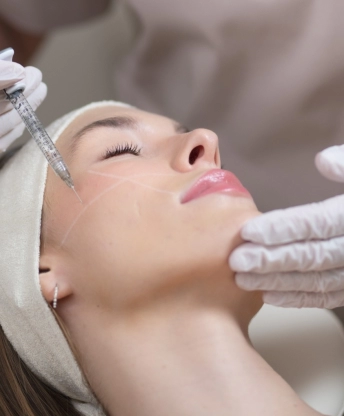Plastic Surgery and body image – When does it help, and when should you seek solutions elsewhere?
In this article, we help you better understand the role plastic surgery can play in boosting self-confidence and when it might be more beneficial to focus on inner growth instead. Stay with us and discover the path to a healthy body image!

Plastic surgery is playing an increasingly significant role today, as many seek to feel more confident in their own skin or subtly enhance their natural features. However, external changes may sometimes conceal deeper self-esteem concerns. Can an aesthetic procedure truly boost confidence, or does it merely cover up body image issues?
Modern beauty standards and the perfectly curated world of social media create constant pressure, making it easy to believe that happiness and self-confidence depend solely on external changes. However, self-acceptance is a much more complex process—it is not just about the reflection in the mirror but also about inner harmony, self-awareness, and consciously recognizing one’s unique beauty.
The Impact of Changing Beauty Standards
The concept of beauty has always been evolving—what was once considered attractive eventually faded into the background, replaced by new trends. Plastic surgery is no exception. While rhinoplasty was one of the most popular procedures in the 1980s and 1990s, body contouring procedures, such as buttock augmentation, have become more prominent today. However, the evolution of aesthetic procedures has coincided with another movement: body positivity and the concept of self-acceptance.
Social media increasingly emphasizes the importance of self-love and confidence. Influencers, celebrities, and brands promote the idea of embracing and loving our bodies as they are. Yet, plastic surgery continues to thrive. According to the American Society of Plastic Surgeons, in 2018, the United States spent $16.5 billion on aesthetic procedures, a figure projected to reach $43.9 billion by 2025.
This raises the question: is there a contradiction between body positivity and plastic surgery? Modern self-acceptance is no longer just about body shape—it also includes the freedom to make personal choices about one’s appearance, whether that involves enhancing a natural feature or undergoing an aesthetic procedure. However, it is crucial to recognize when the desire for change is rooted in self-esteem issues, as body image concerns are appearing at younger ages. In many cases, the solution lies not only in external transformation but also in deeper personal growth.
What is Body Dysmorphic Disorder?
Body dysmorphic disorder (BDD) is a psychological condition in which individuals perceive exaggerated flaws in their physical appearance, often seeing imperfections that those around them do not notice. This condition is associated with anxiety, low self-esteem, and even depression, causing individuals to continuously contemplate altering their appearance.
A common misconception is that an aesthetic procedure alone can resolve these internal insecurities. However, if body dysmorphia is rooted in deeper psychological causes, the change may not lead to lasting satisfaction.
Building self-acceptance and self-confidence is often an internal process, one that may benefit from expert support—such as psychological counseling. The goal is for each individual to make balanced decisions about their appearance, whether that means embracing their natural beauty or opting for an aesthetic procedure.
Plastic Surgery – A Solution or an Escape?
Plastic surgery can be a tool for restoring a healthy relationship with one’s body, but only if approached with realistic expectations and self-awareness. However, some individuals fall into the trap of undergoing multiple procedures without ever experiencing true satisfaction, creating an endless cycle.
It is essential to understand that external changes alone do not guarantee happiness or confidence! Developing self-acceptance and self-esteem is an internal process that cannot be replaced by surgical procedures. The key to long-term success is making conscious decisions and, with the help of professionals, exploring the true motivations behind your desires.
The Impact of Social Media
The often-edited images seen on social media can distort reality and negatively influence self-esteem. Many people strive to align their appearance with these images, which can lead to an increased desire for plastic surgery.
It is important to approach social media content with awareness and remind yourself that many of the images displayed do not reflect reality!
Steps Toward Self-Acceptance
The journey to self-acceptance is long, but the effort is worthwhile. Consider these steps before opting for a drastic procedure!
- Develop self-awareness – Reflect on where your body image concerns stem from and what your true motivations are.
- Seek psychological support – A professional can help uncover the root causes of low self-esteem and guide you through the process of self-acceptance.
- Set realistic expectations – If you choose to undergo plastic surgery, ensure that you have a clear understanding of the procedure’s possibilities and limitations.
- Rely on a supportive environment – Discuss your concerns with family and friends who can provide an objective perspective.
- Use social media consciously – Avoid idealized images and follow accounts that inspire and present a realistic view.
The connection between plastic surgery and mental health
A well-chosen aesthetic procedure can genuinely contribute to increased self-confidence and improved quality of life. When a patient feels more in harmony with their appearance, it can have a positive impact on their daily life, social interactions, and overall well-being.
However, it is crucial that the decision is made consciously, based on realistic expectations, and not driven by external pressures or internal insecurities. Pre-surgical consultations provide an opportunity for patients to understand the expected outcomes of a procedure and reflect on its true purpose. The key to long-term satisfaction lies in self-awareness and self-acceptance. Mental well-being is not solely dependent on external changes but also on how much we value ourselves—both externally and internally. The best results occur when plastic surgery is part of a conscious decision that supports balance and self-confidence.
The Risks of plastic surgery and the dangers of excessive modifications
The goal of plastic surgery is to achieve aesthetic harmony, but some individuals struggle to stop at a single procedure, continuously seeking further modifications. When deeper psychological factors drive the desire for transformation, the procedures fail to bring the anticipated satisfaction. In extreme cases, individuals may alter their appearance to the point of being unrecognizable, without ever feeling truly content.
This is why self-awareness and informed decision-making are crucial before undergoing any aesthetic procedure. Seeking professional support—such as psychological counseling—can help uncover the real motivations behind the desire for change. At Zenon Clinic, we place particular emphasis on ensuring that our patients make well-thought-out and informed decisions, considering both emotional and psychological factors.
Why Is Self-Acceptance So Difficult?
Social media and modern beauty standards constantly put us under pressure. Perfectly edited images and unrealistic expectations make many feel inadequate, leading them to see plastic surgery as the key to satisfaction. However, physical changes alone cannot guarantee inner harmony—confidence and self-acceptance primarily come from within.
The Zenon Clinic Approach: More than just aesthetic procedures
At Zenon Clinic, we take a comprehensive approach to help our patients not only through external changes but also by finding their inner balance.
Personalized solutions – Every patient is unique, and our goal is to offer treatments tailored to individual needs and goals.
Holistic approach – We believe in the harmony of the mind, body, and soul. Our experts support both aesthetic and mental well-being.
Informed decision-making – Our consultations help patients set realistic expectations and understand the true impact of procedures.
Psychological support – In some cases, psychological consultations can play a crucial role in strengthening self-confidence and self-acceptance.
Plastic surgery and self-acceptance are not mutually exclusive, but every procedure should be part of a well-thought-out and conscious decision. Long-term confidence always comes from within—and we provide all the necessary support to help you achieve that balance.
Discover Zenon Clinic’s personalized solutions and take the first step toward a more conscious and balanced self-image!
Book an appointment today and begin your journey toward self-acceptance and confidence!

